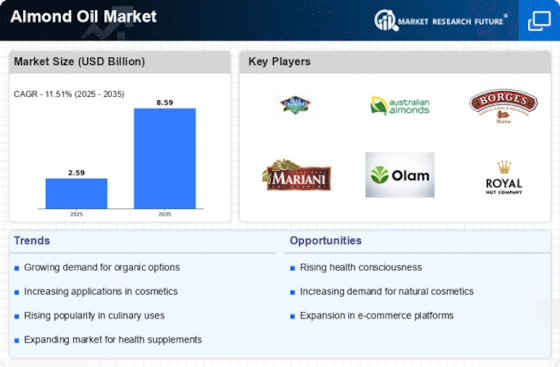Top Industry Leaders in the Almond Oil Market

Strategies adopted by key players in the Almond Oil Market include a strong focus on product quality, supply chain efficiency, and sustainability. These companies emphasize adherence to industry standards and certifications to build trust among consumers. By ensuring a transparent and ethical supply chain, these players aim to secure their market position and meet the increasing demand for natural and responsibly sourced almond oil.
Product diversification is a key strategy employed by major players to cater to a wide range of consumer preferences. In addition to traditional almond oil, companies introduce variations such as cold-pressed, organic, and flavored almond oils to address the evolving needs of health-conscious consumers. This strategy not only expands the product portfolio but also allows companies to tap into niche markets within the overall almond oil segment.
Market share analysis in the Almond Oil Market revolves around factors such as brand reputation, product quality, and distribution networks. Established companies leverage their brand recognition to maintain and expand their market share. Moreover, strategic collaborations with retailers, online platforms, and distributors contribute to the broader reach of almond oil products.
New and emerging companies enter the Almond Oil Market with a focus on innovation and differentiation. These companies often introduce unique formulations, packaging, or extraction techniques to stand out in a crowded market. By targeting specific consumer segments or addressing unmet needs, newcomers aim to carve a niche for themselves amidst established players.
Industry news in the Almond Oil Market frequently involves updates on production processes, technological advancements, and health-related studies. Companies invest in research and development to explore new extraction methods, improve efficiency, and enhance the nutritional profile of almond oil. Health and wellness trends, including the use of almond oil in skincare and beauty products, are often covered in industry news, influencing consumer perceptions.
Current company investment trends in the Almond Oil Market underscore the importance of sustainability, technology, and expansion. Companies invest in sustainable farming practices, water management, and waste reduction to align with consumer preferences for eco-friendly products. Technological investments may include advanced processing equipment, automation, and digitalization of supply chain management. Expansion strategies involve entering new geographic markets or strengthening the presence in existing ones.
The overall competitive scenario in the Almond Oil Market is shaped by a delicate balance between established players and new entrants. While well-known brands benefit from consumer trust and market reach, emerging companies contribute to market dynamism through innovation and novel approaches. The evolving landscape of the almond oil industry reflects the broader trends in consumer preferences, sustainability, and the continuous pursuit of quality in the global market.
Industry News and Investment Landscape:
- Acquisitions in the recent past, such as Blue Diamond Growers' acquisition of Bieler Nut Company, point to tendencies in industry consolidation.
- A emphasis on future growth is indicated by increased expenditures in cutting-edge processing technologies and sustainable farming methods.
- The industry is expanding thanks to the rising popularity of blogs on healthy cuisine and social media influencers that highlight the advantages of almond oil.
Key Companies in the Almond Oil Market Include –
- Florapower GmbH & Co. KG
- Proteco Oils
- Henry Lamotte Oils GmbH
- Eden Botanicals
- Caloy Inc.
- Liberty Vegetable Oil Company
- Jiangxi Baicao Pharmaceutical Co. Ltd
- Aos Product Pvt. Ltd.











